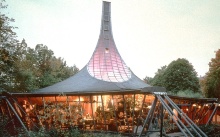Lightweight structures and energy
(1) Focus on content
The core of the specialization "Lightweight Construction and Energy" is the intensive study of the principles of lightweight construction as well as sustainable planning and design. The aim is to impart detailed knowledge for understanding the integral relationships between construction, resource-saving use of materials, form, macro- and microclimatic boundary conditions, energy technologies and architectural quality.
(2) Learning objectives
In interdisciplinary design/project work and seminars, students acquire a comprehensive understanding of the complex problems and diverse approaches to solutions in energy-efficient, resource-saving and sustainable construction:
- competencies for analyzing architectural issues and evaluating the results from the point of view of constructional logic and spatial aesthetics.
- in-depth knowledge of the interdisciplinary relationships between architecture, building envelope and construction
The design topics, formulated together with partners from universities, municipalities and organizations, combine the current state of research with the practice of design and construction. The processing promotes the development of an integrative thinking and design ability and an increasingly independent, individual working method oriented to one's own interests and abilities.
(3) Course offerings and prerequisites for the master's thesis
A prerequisite for registering for the master's thesis is that students have completed the design and project work "Design Studio Lightweight Design and Energy" (15 LP) and two seminars (2 x 6 LP) at the Institute of Lightweight Design and Construction (elective group type 2).
(4) Master thesis
In the master's thesis, students develop an integrated planning concept for a concrete case study in which ecological, functional and design statements are combined in an intelligent and sustainable solution. As a rule, the master's thesis deals with the planning and design of buildings. In doing so, the required focal points of the work can be systematically deepened and elaborated..
(5) Other, e.g. entry in the list of city planners
Graduates with this degree fulfill the requirements for registration in the Baden-Württemberg Chamber of Architects. At the same time, the specialization qualifies students for a wide range of professional perspectives in a national and international context.
Contact

Christoph Nething
M.Arch.Research Assistant


